Roland Kelts's Blog, page 80
December 1, 2010
The Haruki Murakami interviews
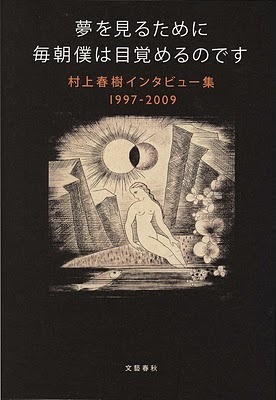 Two of my conversations with Haruki are out now in a comprehensive collection just published in Japan, a week before the release of Anh Hung Tran's film version of Noruwei no Mori / Norwegian Wood. Here are some legal teasers:
Two of my conversations with Haruki are out now in a comprehensive collection just published in Japan, a week before the release of Anh Hung Tran's film version of Noruwei no Mori / Norwegian Wood. Here are some legal teasers: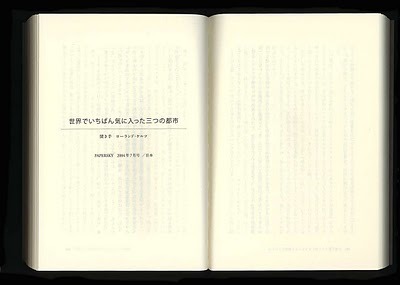
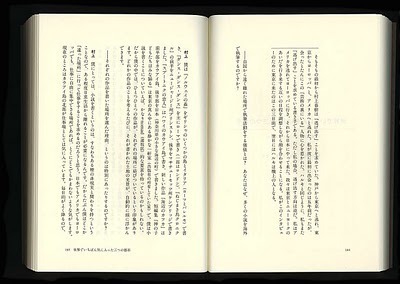
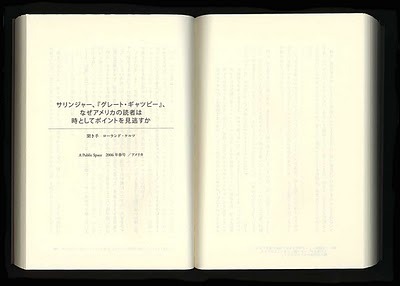
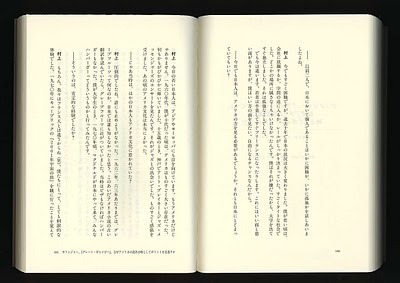
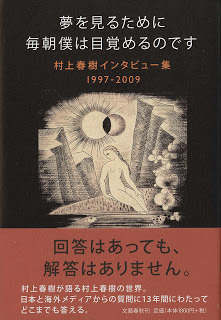
November 29, 2010
Papersky Issue 34: New York City: A Photographic Walk with Shingo Wakagi...
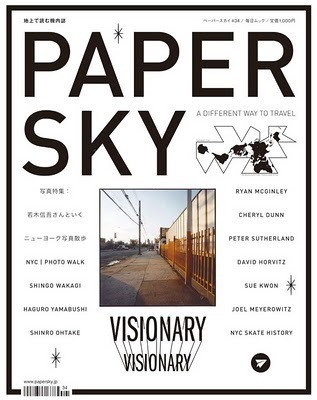 Issue #34 of Paper Sky is out today, featuring a striking range of photos and photographers from New York City, plus my latest column on travel, virtual vs. physical. More
here
.
Issue #34 of Paper Sky is out today, featuring a striking range of photos and photographers from New York City, plus my latest column on travel, virtual vs. physical. More
here
.November 27, 2010
Yomiuri column on revived anime/manga porn bill
Roland Kelts / Special to The Daily Yomiuri
The Tokyo metropolitan government's bungled proposal earlier in the year to broaden its powers of censorship over manga and anime it deemed "harmful to minors" has been occasionally addressed in this column. The fuss started back in March, when a formal protest by manga artist luminaries was followed by similar objections from IT giants Google, Rakuten and others. By June, the legislation was flatly rejected, but not without a vow from Tokyo Gov. Shintaro Ishihara to revamp and try to push it through again this autumn.
The controversial Ishihara has his supporters and detractors. But like him or not, in this instance, there is no denying he is a man of his word.
Now we have Version 2 of the "nonexistent youth bill," so-called because of its opaque language promising to monitor depictions of fictional characters government officials decide are too young to be engaging in the fictional activities government officials decide are too harmful to real youth that government officials decide are too youthful to view or read about them. Ironies abound. Fictional portrayals of nonexistent young characters continue to proliferate as the financially strapped manga and anime industries cater to their largely middle-aged and male otaku core demographic, making more "moe," or soft-core porn imagery, in order to survive. Meanwhile, Japan's real youth are thin on the ground: The nation's notoriously declining birth rate is among the lowest in developed economies, and jobs for those youth who actually do exist in the form of university graduates have grown scarce. What's more, government officials are not doing much to help them.
The metropolitan government's latest efforts are being tracked by the indefatigable Tokyo-based translator Dan Kanemitsu, a half-Japanese writer whose blog, "Dan Kanemitsu's Paper Trail" is a font of cranky observation and excellent insight. According to him, Ishihara and Co. are trying to "sneak" the legislation into approval by making its language vaguer, its goals sanitized. The metropolitan government now aims to control what Kanemitsu calls "the danger posed by fiction that is not obscene, not extremely sexually stimulating, and not strongly prone to compel youth to conduct criminal acts, but is still harmful to youth because it deals with the subject of minors and sexuality in a realm of fiction, especially if presented in an 'anti-social' manner."
I phoned Kanemitsu in Tokyo on the eve of the unveiling of the latest redrafted proposal on Nov. 22. He remains deeply concerned about the legislation's stealthy, under-the-radar nature. "They're doing their best to not raise publicity," Kanemitsu tells me. "And they're doing their best not to [let anyone] examine [the legislation]. I think it's disingenuous, since it's something that could possibly have a lot of impact."
Japan's corrupt society of "press clubs" give voice to the major players who support them. The government issues a statement, journalists dutifully record it, and all bask in the glow of a brutally efficient PR release, disguised as journalism. Democracy, as someone once said, is messy. Japanese politicians and their docile toadies in the media don't like "messiness." Hence the latest step in government efforts to control what you see and read. "They want to go after three things," says Kanemitsu. "They want to go after shojo [girl's manga/anime], yaoi [manga/anime aimed at women and featuring beautiful men who love other men] and cheesecake [pornographic material aimed at men.] Under the existing regulations they could go after yaoi and cheesecake, but not porn. "Japan's current penal code just says that we'll bust you if it's obscene, but it doesn't define what's obscene."
And there's the rub: Who defines what's "obscene," and how does one define it?
The question is even more relevant when one considers the winds of change in our clumsily globalized world. China is weighing in heavily on the question of authority, pressuring its trading partners not to participate in the Nobel Peace Prize ceremony in Norway owing to its clampdown on dissenters, one of whom was awarded this year's peace prize. Meanwhile, Western democratic freedom is manifest in images of British students and protesters smashing windows in central London in response to budget cuts.
Which world would you rather inhabit? "There are two groups of moralists in Japan," Kanemitsu explains. "One is the school teacher who is almost Catholic in stylization, very conservative, old-school Confucian. They are now mixed with progressives who have a feminist point-of-view, and who are anti-pornography more than anything. The old moralists want to make society go back in time; the new moralists want to banish all discrimination against women. But not all members of the Tokyo government want such repressive measures."
Not all. It's a small reed, but a worthy one. Not everyone wants to control what you see, read and hear, and not everyone mistrusts what you think and curate. But at least a small part of the goings-on in Tokyo involves all of us. How do you trust freedom, in its purest, most expressive forms, in a country that fears its own passions?
Yomiuri article--new!
Roland Kelts / Special to The Daily Yomiuri
The Tokyo metropolitan government's bungled proposal earlier in the year to broaden its powers of censorship over manga and anime it deemed "harmful to minors" has been occasionally addressed in this column. The fuss started back in March, when a formal protest by manga artist luminaries was followed by similar objections from IT giants Google, Rakuten and others. By June, the legislation was flatly rejected, but not without a vow from Tokyo Gov. Shintaro Ishihara to revamp and try to push it through again this autumn.
The controversial Ishihara has his supporters and detractors. But like him or not, in this instance, there is no denying he is a man of his word.
Now we have Version 2 of the "nonexistent youth bill," so-called because of its opaque language promising to monitor depictions of fictional characters government officials decide are too young to be engaging in the fictional activities government officials decide are too harmful to real youth that government officials decide are too youthful to view or read about them. Ironies abound. Fictional portrayals of nonexistent young characters continue to proliferate as the financially strapped manga and anime industries cater to their largely middle-aged and male otaku core demographic, making more "moe," or soft-core porn imagery, in order to survive. Meanwhile, Japan's real youth are thin on the ground: The nation's notoriously declining birth rate is among the lowest in developed economies, and jobs for those youth who actually do exist in the form of university graduates have grown scarce. What's more, government officials are not doing much to help them.
The metropolitan government's latest efforts are being tracked by the indefatigable Tokyo-based translator Dan Kanemitsu, a half-Japanese writer whose blog, "Dan Kanemitsu's Paper Trail" (http://dankanemitsu.wordpress.com/) is a font of cranky observation and excellent insight. According to him, Ishihara and Co. are trying to "sneak" the legislation into approval by making its language vaguer, its goals sanitized. The metropolitan government now aims to control what Kanemitsu calls "the danger posed by fiction that is not obscene, not extremely sexually stimulating, and not strongly prone to compel youth to conduct criminal acts, but is still harmful to youth because it deals with the subject of minors and sexuality in a realm of fiction, especially if presented in an 'anti-social' manner."
I phoned Kanemitsu in Tokyo on the eve of the unveiling of the latest redrafted proposal on Nov. 22. He remains deeply concerned about the legislation's stealthy, under-the-radar nature. "They're doing their best to not raise publicity," Kanemitsu tells me. "And they're doing their best not to [let anyone] examine [the legislation]. I think it's disingenuous, since it's something that could possibly have a lot of impact."
Japan's corrupt society of "press clubs" give voice to the major players who support them. The government issues a statement, journalists dutifully record it, and all bask in the glow of a brutally efficient PR release, disguised as journalism. Democracy, as someone once said, is messy. Japanese politicians and their docile toadies in the media don't like "messiness." Hence the latest step in government efforts to control what you see and read. "They want to go after three things," says Kanemitsu. "They want to go after shojo [girl's manga/anime], yaoi [manga/anime aimed at women and featuring beautiful men who love other men] and cheesecake [pornographic material aimed at men.] Under the existing regulations they could go after yaoi and cheesecake, but not porn. "Japan's current penal code just says that we'll bust you if it's obscene, but it doesn't define what's obscene."
And there's the rub: Who defines what's "obscene," and how does one define it?
The question is even more relevant when one considers the winds of change in our clumsily globalized world. China is weighing in heavily on the question of authority, pressuring its trading partners not to participate in the Nobel Peace Prize ceremony in Norway owing to its clampdown on dissenters, one of whom was awarded this year's peace prize. Meanwhile, Western democratic freedom is manifest in images of British students and protesters smashing windows in central London in response to budget cuts.
Which world would you rather inhabit? "There are two groups of moralists in Japan," Kanemitsu explains. "One is the school teacher who is almost Catholic in stylization, very conservative, old-school Confucian. They are now mixed with progressives who have a feminist point-of-view, and who are anti-pornography more than anything. The old moralists want to make society go back in time; the new moralists want to banish all discrimination against women. But not all members of the Tokyo government want such repressive measures."
Not all. It's a small reed, but a worthy one. Not everyone wants to control what you see, read and hear, and not everyone mistrusts what you think and curate. But at least a small part of the goings-on in Tokyo involves all of us. How do you trust freedom, in its purest, most expressive forms, in a country that fears its own passions?
Kelts is a visiting scholar at the University of Tokyo who divides his time between Tokyo and New York. He is the author of "Japanamerica: How Japanese Pop Culture Has Invaded the U.S." (www.japanamericabook.com).
(Nov. 26, 2010)November 25, 2010
Talking Turkey w/NHK about Akira
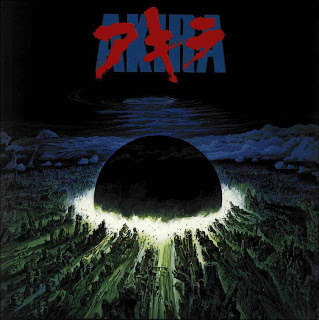
'SHELLY,' Jonathan Sherr and I discuss Katsuhiro Otomo's manga and anime epic, Akira, on NHK's "Japan Unlocked" broadcast today (Thursday) and tomorrow.
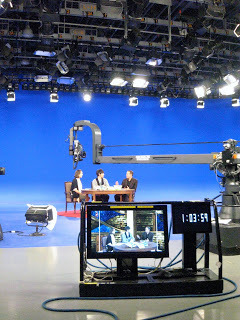 The show will be streamed online six times here, once every four hours starting at 6:30 p.m. EST/ 3:30 p.m. PST / 11:30 p.m. GMT on Thursday, November 25--beginning at 8:30 a.m. Friday, November 26, JST.
The show will be streamed online six times here, once every four hours starting at 6:30 p.m. EST/ 3:30 p.m. PST / 11:30 p.m. GMT on Thursday, November 25--beginning at 8:30 a.m. Friday, November 26, JST. 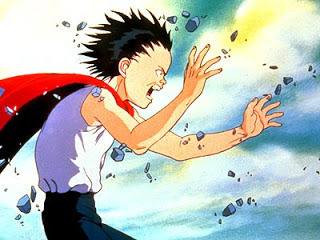
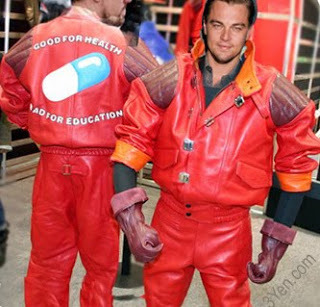 I can't vouch for the contents because I can't recall what I said and haven't seen the edited version. But like most recordings, it will be aired and readily available online anyway. Apologies in advance.
I can't vouch for the contents because I can't recall what I said and haven't seen the edited version. But like most recordings, it will be aired and readily available online anyway. Apologies in advance.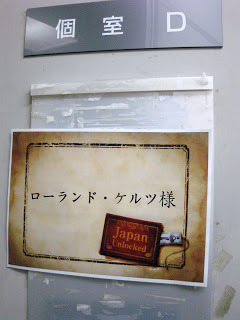
Murakami does Macy's, T-Day 2010
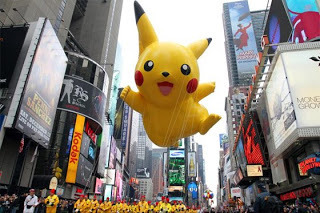 The sight of Pikachu, Pokemon's electrifying yellow mouse mascot, soaring above Manhattan five years ago in the annual Macy's Thanksgiving Day Parade was one of the catalysts for writing Seeing Pikachu's balloon likeness alongside American stalwarts from my childhood like Snoopy, Mickey, Bullwinkle and others seemed a striking statement of just how deeply Japanese animation and its iconic character designs had penetrated so-called 'mainstream' American sensibilities.
The sight of Pikachu, Pokemon's electrifying yellow mouse mascot, soaring above Manhattan five years ago in the annual Macy's Thanksgiving Day Parade was one of the catalysts for writing Seeing Pikachu's balloon likeness alongside American stalwarts from my childhood like Snoopy, Mickey, Bullwinkle and others seemed a striking statement of just how deeply Japanese animation and its iconic character designs had penetrated so-called 'mainstream' American sensibilities.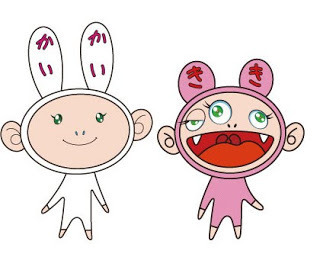
A few months ago in New York, I read in the New York Times's Art Beat blog that conceptual artist Takashi Murakami's blissed-out and vaguely menacing icons, Kaikai and Kiki, would be the next Macy's participants to make the trans-Pacific T-Day flight from Japan. Hardly ubiquitous children's fare like Pokemon, K & K are unlikely to elicit squeals of recognition, as yesterday's NYT story notes, and might just cause shudders of discomfort in those kids seduced into staring.
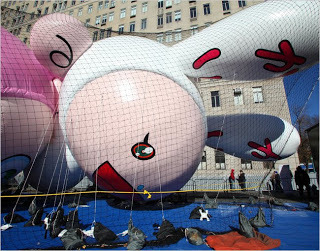 [photos-NYT]But Murakami's unsettlingly passive-aggressive take on kawaii, or the Japanese aesthetic of needy uber-cuteness, may be softened a bit by the artist's own presence, marching alongside his creations down Central Park West in a self-designed, goofy-green, smiley-faced flower costume, laughing, once again, all the way back to the bank.
[photos-NYT]But Murakami's unsettlingly passive-aggressive take on kawaii, or the Japanese aesthetic of needy uber-cuteness, may be softened a bit by the artist's own presence, marching alongside his creations down Central Park West in a self-designed, goofy-green, smiley-faced flower costume, laughing, once again, all the way back to the bank.
November 23, 2010
Chalmers Johnson, 1931-2010
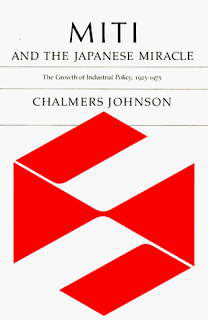 Japan scholar, author, and critic of American Imperialism, Chalmers Johnson, died on Saturday, November 20, 2010. To those of us who read and write about Japan--and America--his work remains essential. Here's a solid account of his life and writing by John Nichols of The Nation, posted here at AlterNet.org.:Chalmers Johnson, Visionary Scholar on Empire and Decline of America Passes AwayBy John Nichols, The Nation
Japan scholar, author, and critic of American Imperialism, Chalmers Johnson, died on Saturday, November 20, 2010. To those of us who read and write about Japan--and America--his work remains essential. Here's a solid account of his life and writing by John Nichols of The Nation, posted here at AlterNet.org.:Chalmers Johnson, Visionary Scholar on Empire and Decline of America Passes AwayBy John Nichols, The NationPosted on November 22, 2010, Printed on November 23, 2010http://www.alternet.org/story/148952/
With one word, "blowback," Chalmers Johnson explained the folly of empire in the modern age.
In the aftermath of the terrorist attacks of September11, 2001, true American patriots—as opposed to the jingoists and profiteers whose madness and greed would steer a republic to ruin—needed a new language for a new age.
They got it from Johnson. His 2000 book, Blowback,: The Costs and Consequences of American Empire (Macmillan), he took an old espionage term—which referred to the violent, unintended consequences of covert (and sometimes not so covert) operations that are suffered even by superpowers such as the United States—became an essential text for those who sought to explain the attacks and to forge sounder and more responsible foreign policies for the future.
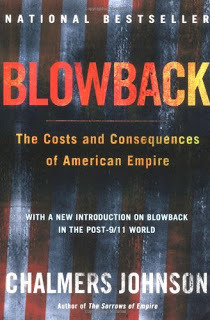 Johnson, who has died at age 79, was no liberal idealist. He was the an old Asian hand who had chaired the Center for Chinese Studies at the University of California-Berkeley from 1967 to 1972 and then served as president and co-founder of the Japan Policy Research Institute. In other words, he was a man of the world who knew how the world worked. And what he tried to explain, to political leaders and citizens, was that the old ways of empire building (and maintaining) no longer worked in an age of instant communications, jet travel and doomsday weaponry.
Johnson, who has died at age 79, was no liberal idealist. He was the an old Asian hand who had chaired the Center for Chinese Studies at the University of California-Berkeley from 1967 to 1972 and then served as president and co-founder of the Japan Policy Research Institute. In other words, he was a man of the world who knew how the world worked. And what he tried to explain, to political leaders and citizens, was that the old ways of empire building (and maintaining) no longer worked in an age of instant communications, jet travel and doomsday weaponry.
"In Blowback, I set out to explain why we are hated around the world," Johnson explained in Nemesis: The Last Days of the American Republic, another of his series of three books on imperialism and empire, which became best sellers in the period after the 9-11 attacks. "The concept 'blowback' does not just mean retaliation for things our government has done to and in foreign countries. It refers to retaliation for the numerous illegal operations we have carried out abroad that were kept totally secret from the American public. This means that when the retaliation comes—as it did so spectacularly on September 11, 2001—the American public is unable to put the events in context. So they tend to support acts intended to lash out against the perpetrators, thereby most commonly preparing the ground for yet another cycle of blowback. In the first book in this trilogy, I tried to provide some of the historical background for understanding the dilemmas we as a nation confront today, although I focused more on Asia—the area of my academic training—than on the Middle East."
Johnson, a frequent contributor to The Nation in his later years, argued in his most impressive book, The Sorrows of Empire, that Americans needed to recognize something that their leaders denied: that the United States, a nation founded in opposition to empire, had become an empire.
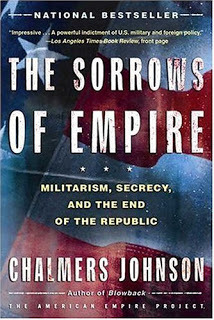
"The Sorrows of Empire was written during the American preparations for and launching of the invasions and occupations of Afghanistan and Iraq," he explained. "I began to study our continuous military buildup since World War II and the 737 military bases we currently maintain in other people's countries. This empire of bases is the concrete manifestation of our global hegemony, and many of the blowback-inducing wars we have conducted had as their true purpose the sustaining and expanding of this network. We do not think of these overseas deployments as a form of empire; in fact, most Americans do not give them any thought at all until something truly shocking, such as the treatment of prisoners aGuantanamo Bay, brings them to our attention. But the people living next door to these bases and dealing with the swaggering soldiers who brawl and sometimes rape their women certainly think of them as imperial enclaves, just as the people of ancient Iberia or nineteenth-century India knew that they were victims of foreign colonization."
Johnson, in his last years, became a hero to old-right conservatives and new-left radicals, who recognized the truth of his observations about "the sorrows (of empire that are) already invading our lives, which (are) likely to be our fate for years to come: perpetual war, a collapse of constitutional government, endemic official lying and disinformation, and finally bankruptcy."
"The United States today is like a cruise ship on the Niagara River upstream of the most specacular falls in North America," Johnson warned. "A few people on board have begun to pick up a slight hiss in the background, to observe a faint haze of mist in the air on their glasses, to note that the river current seems to be running slightly faster. But no one yet seems to have realized that it is almost too late to head for shore. Like the Chinese, Ottoman, Hapsburg, imperial German, Nazi, imperial Japanese, British, French, Dutch, Portuguese, and Soviet empires in the last century, we are approaching the edge of a huge waterfall and are about to plunge over it."
Johnson knew his history—not just the history of empires that had fallen, but of the American experiment.
Many of his truest and most cherished reference points came from the republic's founding. We shared a passion for a James Madison's writings on the perils of imperialism in general. In particular, that passion took us to Madison's great 1795 line from Political Observations: "Of all the enemies of true liberty, war is, perhaps, the most to be dreaded, because it comprises and develops the germ of every other. War is the parent of armies; from these proceed debts and taxes; and armies, and debts, and taxes are the known instruments for bringing the many under the domination of the few. In war, too, the discretionary power of the executive is extended… War is in fact the true nurse of executive aggrandizement. In war, a physical force is to be created; and it is the executive will, which is to direct it. In war, the public treasuries are to be unlocked; and it is the executive hand which is to dispense them…"
Chalmers Johnson, a true son of the wisest and best of the founding generation, spoke the language of James Madison, when he argued that a republic could not maintain more than 700 military bases on foreign soil and retain its own freedom.
It was a Madisonian impulse that caused Johnson to warn us that: "As militarism, the arrogance of power, and the euphemisms required to justify imperialism inevitably conflict with America's democratic structure of government and distort its culture and basic values, I fear that we will lose our country."
It is a similarly Madisonian impulse, or what remains of it, that will cause genuine patriots to read Johnson as they do the founders for generations to come.
John Nichols is The Nation's Washington correspondent.
© 2010 The Nation All rights reserved.November 12, 2010
Japan & Obama: humiliation & humbling
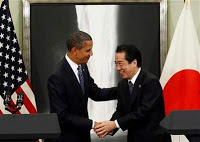

Opinion Obama in Japan: what a difference a bad year makes
Since the US president met with his Japanese counterpart last year, Obama has been belittled by voters, and Japan has been humiliated by its neighbors. Today, Japan and America need each other badly, and maybe more than ever.
By Roland Kelts / November 12, 2010 TokyoPresident Obama arrived in Tokyo today, exactly one year to the day of his first official trip to Japan as commander-in-chief. He is here to attend the Asia Pacific Economic Cooperation summit in Yokohama, but his itinerary includes a brief "personal" excursion to the Great Buddha, a 44-foot tall bronze statue in Kamakura, which Mr. Obama first visited as a boy with his mother. While it is safe to say that the seven-and-a-half centuries old Buddha has changed very little since last November, or even since Mr. Obama's childhood encounter, the state of his host nation has shifted significantly.
Last year, the Japan that greeted Obama was star-struck by the man, less so by the nation he had been elected to represent. Domestic voters had only a few months earlier managed to unseat the Liberal Democratic Party, whose nearly unbroken 50-year plus dominance of Japanese politics was largely characterized by policies friendly to American business and the US military. Its successor, the Democratic Party of Japan, won on a platform that was both more socialistic economically, and more Asia-friendly politically.Obama, Japan, bad tidings
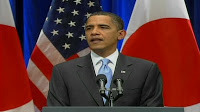
Opinion Obama in Japan: what a difference a bad year makes
Since the US president met with his Japanese counterpart last year, Obama has been belittled by voters, and Japan has been humiliated by its neighbors. Today, Japan and America need each other badly, and maybe more than ever.
By Roland Kelts / November 12, 2010 TokyoPresident Obama arrived in Tokyo today, exactly one year to the day of his first official trip to Japan as commander-in-chief. He is here to attend the Asia Pacific Economic Cooperation summit in Yokohama, but his itinerary includes a brief "personal" excursion to the Great Buddha, a 44-foot tall bronze statue in Kamakura, which Mr. Obama first visited as a boy with his mother. While it is safe to say that the seven-and-a-half centuries old Buddha has changed very little since last November, or even since Mr. Obama's childhood encounter, the state of his host nation has shifted significantly.
Last year, the Japan that greeted Obama was star-struck by the man, less so by the nation he had been elected to represent. Domestic voters had only a few months earlier managed to unseat the Liberal Democratic Party, whose nearly unbroken 50-year plus dominance of Japanese politics was largely characterized by policies friendly to American business and the US military. Its successor, the Democratic Party of Japan, won on a platform that was both more socialistic economically, and more Asia-friendly politically.November 11, 2010
Far East to East Coast: Bo-Peep's kawaii killer rock
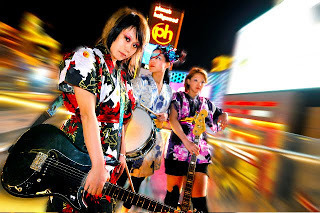 Bo-Peep en route to the USA
Bo-Peep en route to the USAFirst X Japan, then Vamps, and now Bo-Peep, a female hard rock trio, crash into the East Coast this autumn for a J-Rock invasion: Providence, New York, Philly, Milford, CT and Boston, with two dates in NYC, one each in Brooklyn and Manhattan. Pal Ethan Green is managing the tour; dates and info below. Starts Friday.
Tokyo calling?
"VIBE" USA TOURSUSHI BURNING! GEISHA BURNING! HANABI BURNING!
Friday, November 12AS220, Providence, Rhode IslandGirls Rock Showcase9PM$10http://as220.org/calendar.html
Sunday, November 14The Trash Bar, Brooklyn, New York11PM$6http://www.thetrashbar.com
Monday, November 15thPhiladelphia Mausoleum of Contemporary Art, Philadelphia, Pennsylvania8PMhttp://www.philamoca.com/
Tuesday, November 16thO'briens Pub, Allston, Massachusetts8:30PM$7http://www.obrienspubboston.com/
Wednesday, November 17thDaniel Street Club, Milford, Connecticut8PM$8http://manicproductions.org/
Thursday, November 18thArlene's Grocery, Manhattan, New York12AM (technically Friday morning)$8http://www.arlenesgrocery.net/



